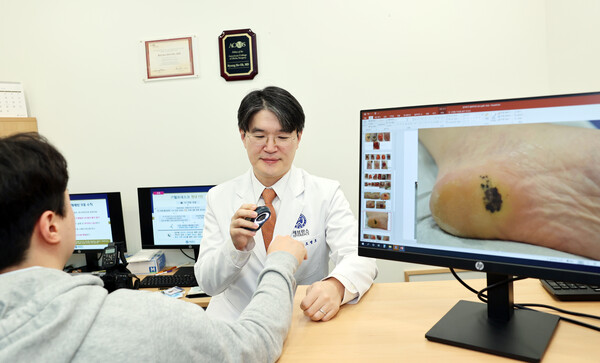Severance Hospital has established a specialized fast-track treatment program for melanoma patients, aiming to reduce waiting times and expedite care.

Under the program, consultations are dedicated exclusively to melanoma patients every Tuesday morning, enabling treatment to commence within one week of diagnosis.
Melanoma is a malignant tumor originating from melanocytes, the cells responsible for producing skin pigment. According to the Ministry of Health and Welfare’s cancer registry statistics published in April, the number of malignant melanoma cases in Korea rose from 217 in 1999 to 688 in 2021, marking a threefold increase. The five-year survival rate for melanoma was reported at 63.9 percent between 2015 and 2019, reflecting its poor prognosis.
A significant challenge in Korea is that melanoma often presents with no distinct symptoms and may resemble benign moles on the hands or feet. Delayed treatment heightens the risk of recurrence and metastasis, which can occur unpredictably, emphasizing the need for rapid intervention upon diagnosis.
To enhance patient outcomes, Severance Hospital has also bolstered its multidisciplinary care system for melanoma. Effective management involves complete excision of lesions, lymph node biopsies to assess metastatic spread and disease staging, as well as coordinated postoperative chemotherapy and radiotherapy. This requires seamless collaboration across multiple departments.
Severance's multidisciplinary team includes specialists from dermatology, oncology, radiation oncology, pathology, gynecology, otolaryngology, radiology, ophthalmology, transplant surgery, breast surgery, plastic surgery, and orthopedics.
The hospital stressed that the comprehensive approach ensures that patients receive all necessary treatments promptly.
“For instance, dermatologists excise melanoma, while lymph node metastases are handled by respective specialists based on the tumor's location, the otolaryngology team addresses cervical lymph nodes for head and neck melanomas, the breast surgery team targets axillary lymph nodes for arm and hand melanomas, and the transplant surgery team manages inguinal lymph nodes for lower limb cases,” the hospital said. “Subsequently, oncologists and radiation oncologists administer systemic treatments to prevent further metastasis via the bloodstream or lymphatic system.”
The hospital highlighted a notable case demonstrating the success of its advanced care model.
A Korean patient working in Thailand delayed seeking medical attention despite noticing a growing mole on his left foot. When bleeding from the lesion and palpable lumps in his groin appeared, he returned to Korea and was diagnosed with metastatic malignant melanoma.
At Severance Hospital, the melanoma was removed using Mohs micrographic surgery, a technique that spares healthy tissue by excising the tumor in thin layers and examining each layer microscopically to ensure complete removal.
Following surgery, the patient underwent two rounds of inguinal lymph node dissection and subsequent radiotherapy and targeted therapy. He has remained recurrence-free for three and a half years and continues to lead a normal life.
Professor Oh Byung-ho, Korea’s only dermatologist certified by the American College of Mohs Surgery, emphasized the critical importance of early diagnosis and treatment, as melanoma prognosis deteriorates rapidly with disease progression.
“We are now focusing on surgeries that preserve the function of fingers and toes, supported by our robust multidisciplinary system, which is essential for achieving the best outcomes,” he said.
Related articles
- Doctors call for urgent reforms in Korea's ICU rebhabilitation system amid lack of coverage
- Pet loss syndrome can get serious enough to cause depression
- Yongin Severance Hospital opens international clinic for foreign patients
- Yonsei Cancer Center's colorectal surgery department completes 2,000th robotic surgery
- Ovarian cancer linked to endometriosis can be detected earlier than typical ovarian cancer
- Yonsei study links low muscle density to worse treatment outcomes in breast cancer
- Yonsei researchers discover how gut microbes regulate gastric stem cells

